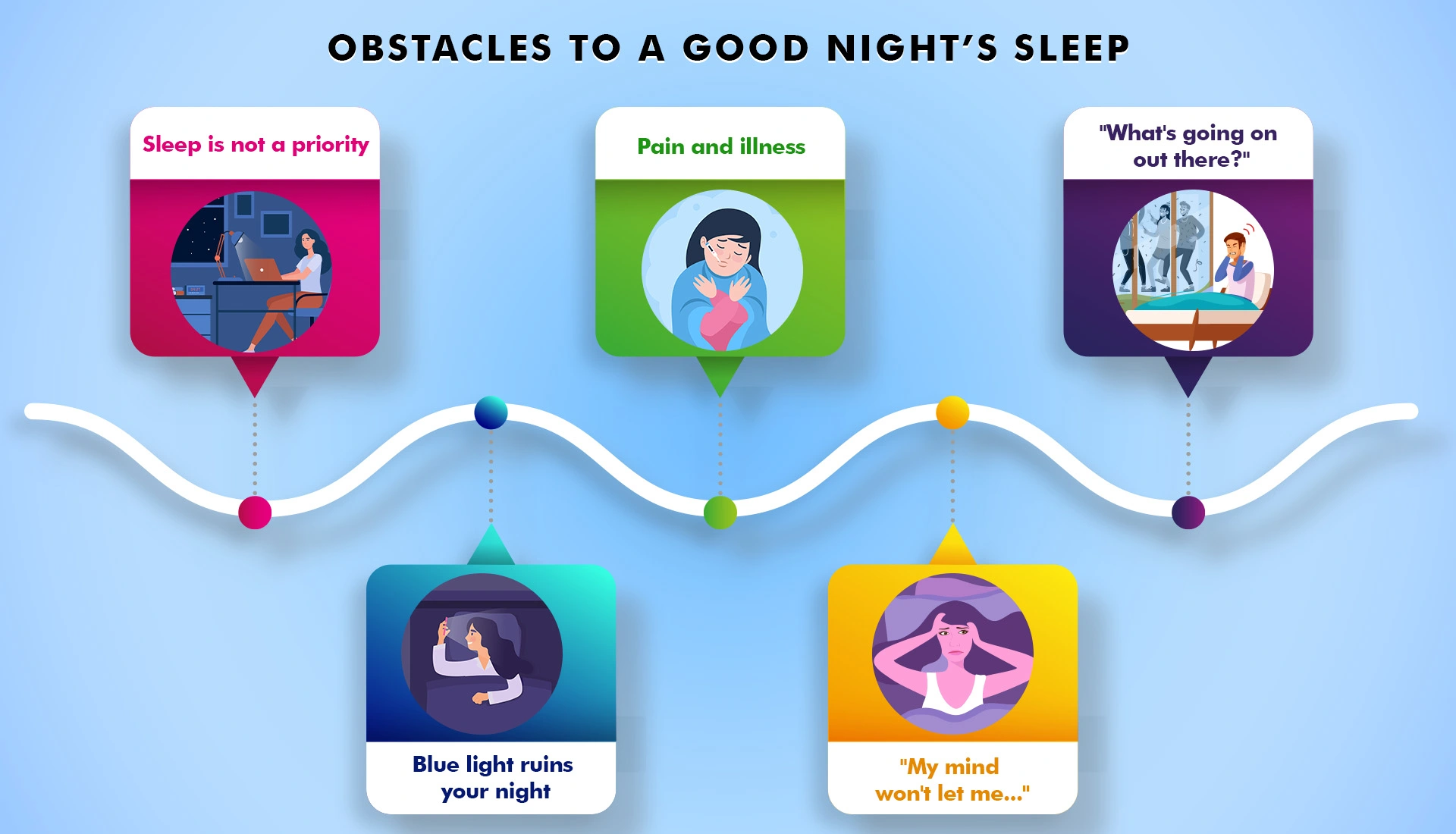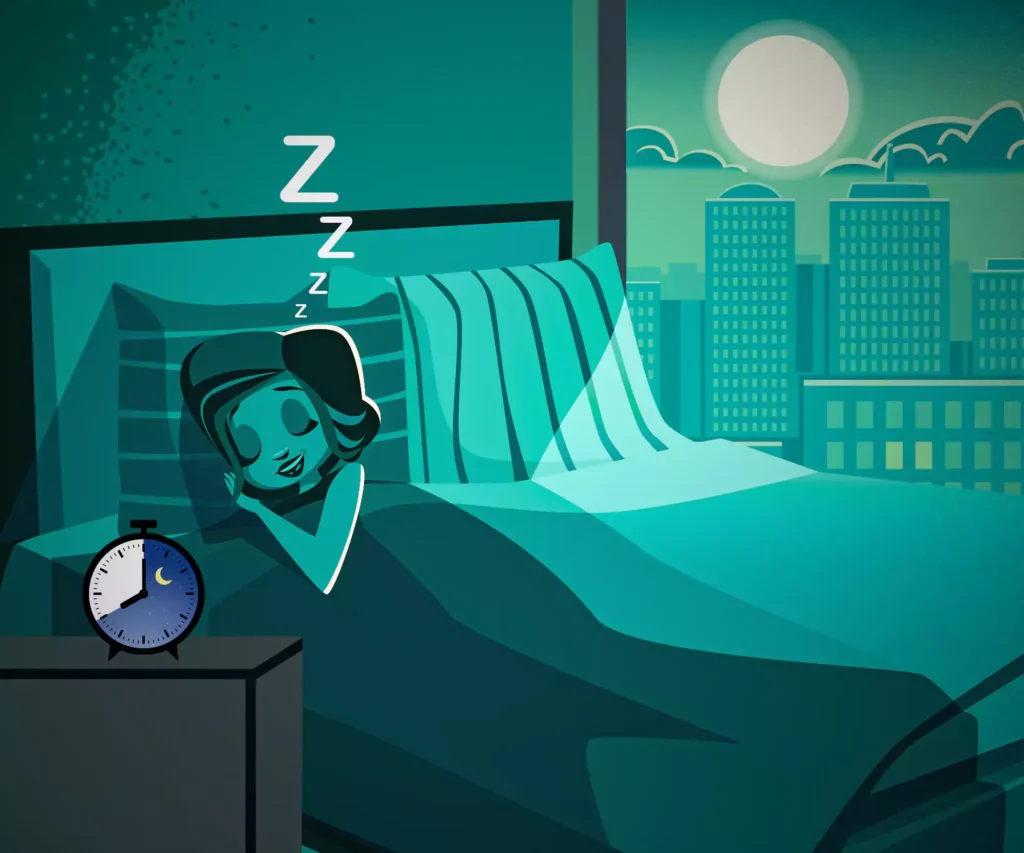If you’ve read about signs of poor sleep, you might have recognised quite a few symptoms in yourself. But what if you have these signs of sleep deprivation despite putting in a solid 8 hours? Do you have a routine where you’re usually out like a light and wake up still bleary-eyed and dozy? Cases such as this are a bit tricky. Yes, the duration of sleep is significant. But the quality of your sleep is equally important! You might wonder exasperatedly what this added metric is all about. So here’s a quick breakdown of how disruptions in your sleep cycle can result in you waking up like any of Snow White’s dwarves: Grumpy, Sleepy, Dopey or Happy!
Why are sleep cycles important?
We think of sleep as a period when your eyes are closed, and your consciousness is relaxed. But multiple processes are going on in your body during this time.
‘Sleep’ itself consists of two cycles. In the first, your body goes through two stages of relaxation and enters a third stage, which is deep sleep. From this stage, your body goes into REM sleep (the stage with the technicolour dreams!). Here, your brain activity and physical functions increase a bit before again going through the two stages of slowing down or relaxation. Then, finally, you get back into the deep sleep phase.
This complete cycle needs to occur multiple times at night. Each stage takes care of its own set of bodily functions. In the deep sleep stage, our body is actually in recovery mode. During this stage, tissues get repaired, strengthening your immune system. Lack of deep sleep leaves you weaker on multiple levels. Physically, your strength depletes as your muscles have not recovered from the day’s activity. The body cannot complete any necessary repairs, and your immune system becomes weaker. Mentally, the lack of good-quality sleep has multiple repercussions, such as chronic fatigue, heightened anxiety, and slower cognitive processes.

Disruptions to sleep cycles
So, as we said, it’s essential to cycle through all of these stages smoothly. Any disruption in any part of a cycle leads to fewer sleep cycles. Disturbances force you to start over at the ‘starting to relax’ stage, undoing the effects of whatever stage you were in before. These disruptions can occur in microseconds! This period is so minute that you’re not even likely to register or remember it in the morning consciously. Thus, you may think you slept all night when in fact, several disturbances interrupted your sleep cycle and reset it.
When you should be worried about your sleep
You need to consult a doctor if you get seven (or more) hours of sleep but do not feel rested or refreshed. A trained professional may ask you to get a sleep study done. A sleep study analyses how your body behaves during sleep and measures your sleep cycles and duration of deep sleep: are you waking up multiple times at night? Do you have episodes of sleepwalking? Are you talking in your sleep? Is there a lot of physical restlessness?
Sleep apnea is often a leading culprit here. It is a condition where a person experiences breathing difficulties at night, which prevents them from getting a whole night’s sleep. One of the most common symptoms is snoring. However, you may not be a loud snorer and still suffer from it. While it is a common enough condition, it is still not widely discussed, and many people laugh off their snoring issues. It may, however, cause health issues (hypertension, heart disorders, stroke risk and diabetes, among others) and mental health problems like depression and poor concentration and coordination.
The good news is that a simple sleep study can tell you whether or not you have sleep apnea and what kind of condition you have. In addition, various devices and machines help you manage the condition and get a good night’s sleep. For example, simple prosthetic devices can help you align your jaw if that is causing the issue. Surgery can sometimes reduce any internal blockage or correct any nasal issues. Additionally, CPAP machines gently pump air at a continuous pressure so that your airways remain open and your body can breathe easily and naturally. Sleep tracking options in digital watches or fitness gear can also come in handy to track disturbances and the time spent in deep sleep.
External conditions that impact your sleep cycle
A vital hormone responsible for the sleep cycle, melatonin, depends on external light conditions. Usually, as daylight wanes, our body starts increasing melatonin production. People are encouraged to get into natural light as often as possible during the day to help with this. Also, excessive lighting within our house and bright screens hamper melatonin production, making it harder to fall asleep.
All in all, sleep depends on external conditions (light, temperature, sound). But it significantly affects internal processes (melatonin secretion, how relaxed the body is to enter the first stage of sleep, and going through uninterrupted sleep cycles). Therefore, to maximise the repair, regeneration and rest we experience, we must pay attention to how we feel in the morning and at night. Thus, you should consult a professional immediately if anything feels off for more than a few days to a week.

